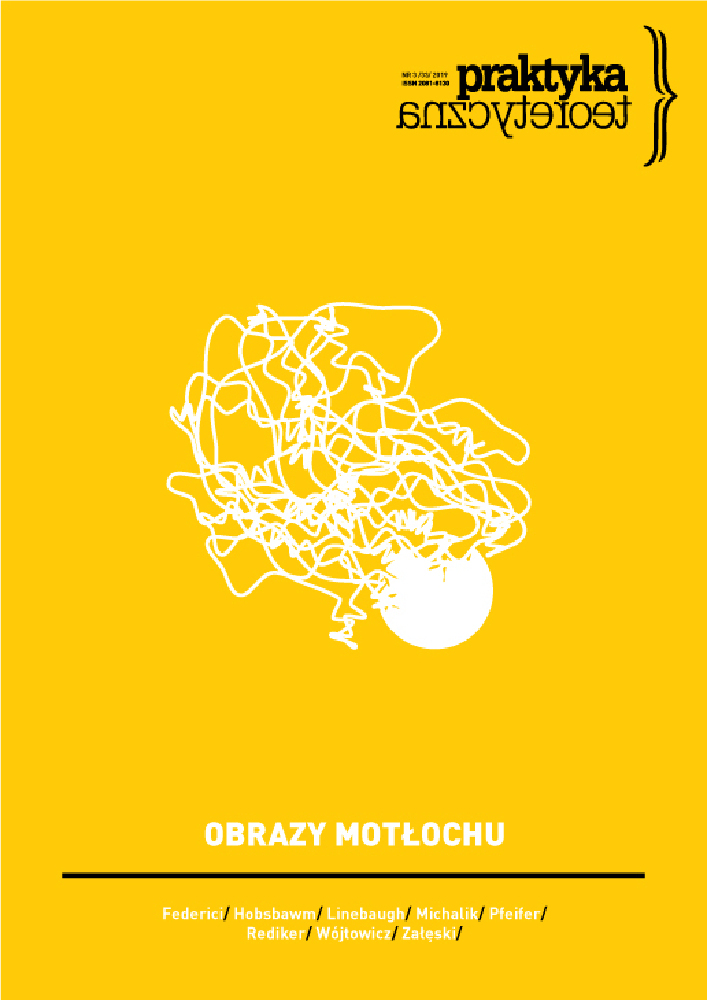Abstract
This is a translation of the final chapter of Re-enchanting the World: Feminism and the Politics of the Commons (2019) by Silvia Federici. The author opposes the opinion that technological development brings about more freedom for society and illustrates how it is accompanied by a growing level of exploitation. According to her, the exploitation of labour is rendered possible by ”a history of the disaccumulation” of common goods and pre-capitalist capacities, connected to our immediate, non-privatised contact with nature. In the second part, Federici argues that today’s struggles in defense of the commons, often led by women, has gained fundamental and global importance. She advocates for reproductive labor as a responsible and paradoxically subversive strategy in the face of political and ecological crisis.References
Berardi, Franco „Bifo”. 2009. Precarious Rhapsody. London: Minor Compositions.
Conner, Clifford D. 2005. A People’s History of Science: Miners, Midwives, and Low Mechanicks. New York: Nation Books.
Federici, Silvia. 2004. Caliban and the Witch: Women, the Body and Primitive Accumulation. New York: Autonomedia.
Federici, Silvia. 2012. Revolution at Point Zero: Housework, Reproduction, and Feminist Struggle. Oakland: PM Press.
Hardt, Michael i Antonio Negri. 2012. Rzecz-pospolita. Poza własność prywatną i dobro publiczne. Tłum. Praktyka Teoretyczna. Kraków: Wydawnictwo Korporacji Ha!art.
Kahn, Robbie Pfeufer. 1989. „Women and Time in Childbirth and Lactation”. W Taking Our Time: Feminist Perspectives on Temporality, red. Frieda Johles Forman i Caoran Sowron. Oxford: Pergamon Press.
Mander, Jerry. 1991. In the Absence of the Sacred: The Failure of Technology and the Survival of the Indian Nations. San Francisco: Sierra Club Books.
Marks, Karol. 1951. Kapitał: Krytyka ekonomii politycznej. Tom 1. Proces wytwarzania kapitału. Warszawa: Książka i Wiedza.
Samuel, Raphael. 1992. „Mechanization and Hand Labour in Industrializing Britain”. W The Industrial Revolution and Work in Nineteenth-Century Europe, red. Lenard R. Berlanstein London: Routledge.
Sarkar, Saral. 1999. Eco-Socialism or Eco-Capitalism? A Critical Analysis of Humanity’s Fundamental Choices. London: Zed Books.
Shapiro, Tricia. 2010. Mountain Justice: Homegrown Resistance to Mountaintop Removal for the Future of Us All. Oakland: AK Press.
Shiva, Vandana. 1989. Staying Alive: Women, Ecology and Development. London: Zed Books.
Ullrich, Otto. 1992. „Technology”. W The Development Dictionary: A Guide to Knowledge as Power, red. Wolfgang Sachs. London: Zed Books.
Wackernagel, Mathis i William Rees. 1996. Our Ecological Footprint: Reducing Human Impact on the Earth. Philadelphia: New Society Publishers.
Weatherford, Jack. 1988. Indian Givers: How the Indians of the Americas Transformed the World. New York: Fawcett Books.
Weber, Max. 1999. „Nauka jako zawód czy powołanie?”. Tłum. Paweł Dybel. W Zdzisław Krasnodębski. M. Weber. Warszawa: Wiedza Powszechna.
Wypijewski, JoAnn. 2009. „Death at Work in America”. Counterpunch.29 kwietnia 2009. https://www.counterpunch.org/2009/04/29/death-at-work-in-america/.
License
“Theoretical Practice” seeks to put into practice the idea of open access to knowledge and broadening the domain of the commons. It serves the development of science, thinking and critical reflection. The journal is published in open-access mode under the CC-BY-NC-SA 4.0 license (detail available here: http://creativecommons.org/licenses/by-nc-sa/4.0/). Articles published in the journal may be freely distributed, stored, printed and utilized for academic and teaching purposes without restrictions.
They should not be, however, used for any commercial purposes or be reconstructed into derivative creations. Access to the journal may not be limited or offered for a fee by any third party.
Prospective authors are obliged to fill in, sign and send back the publishing contract compliant with the CC licencing. [PL.pdf, PL.doc, EN.pdf,EN.doc].
According to this contract, authors grant the journal a non-exclusive right to publish their work under the creative commons license (CC-BY-NC-SA 4.0) without any financial obligation on both sides of the contract.
Before submission authors should make sure that derivative materials they use are not protected by copyright preventing their non-commercial publication. Authors are responsible for any respective copyright violations.
